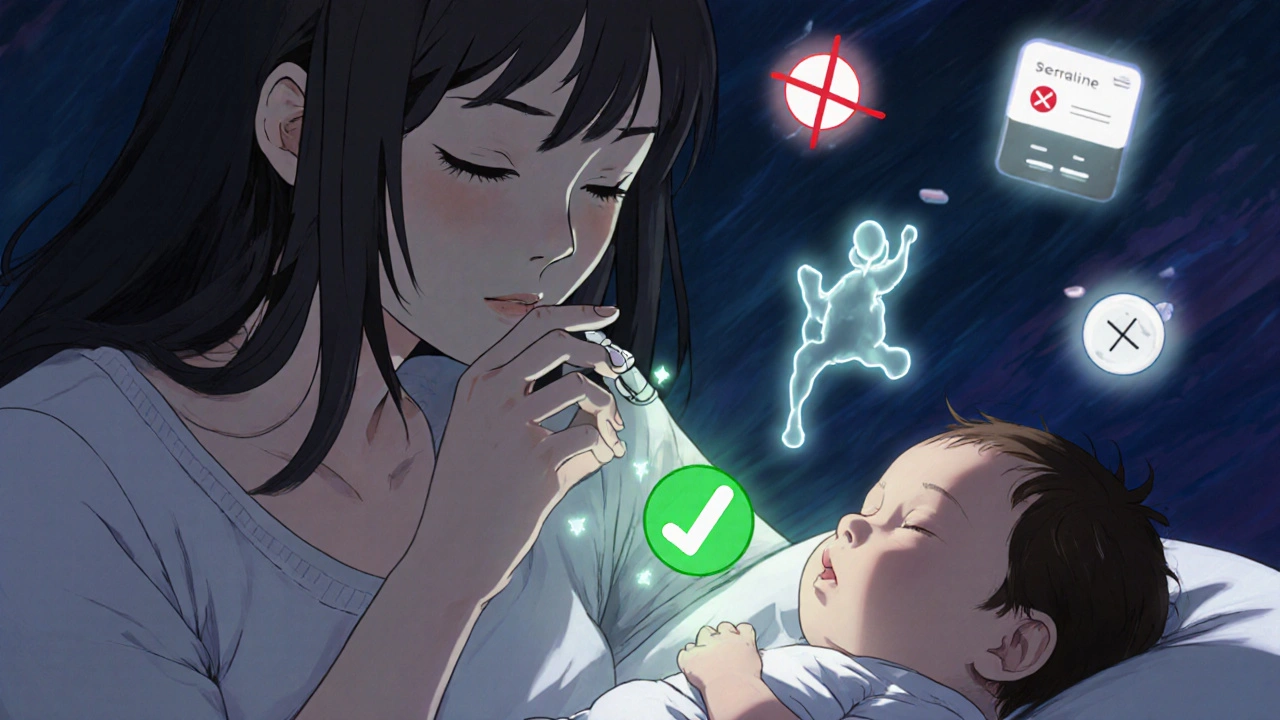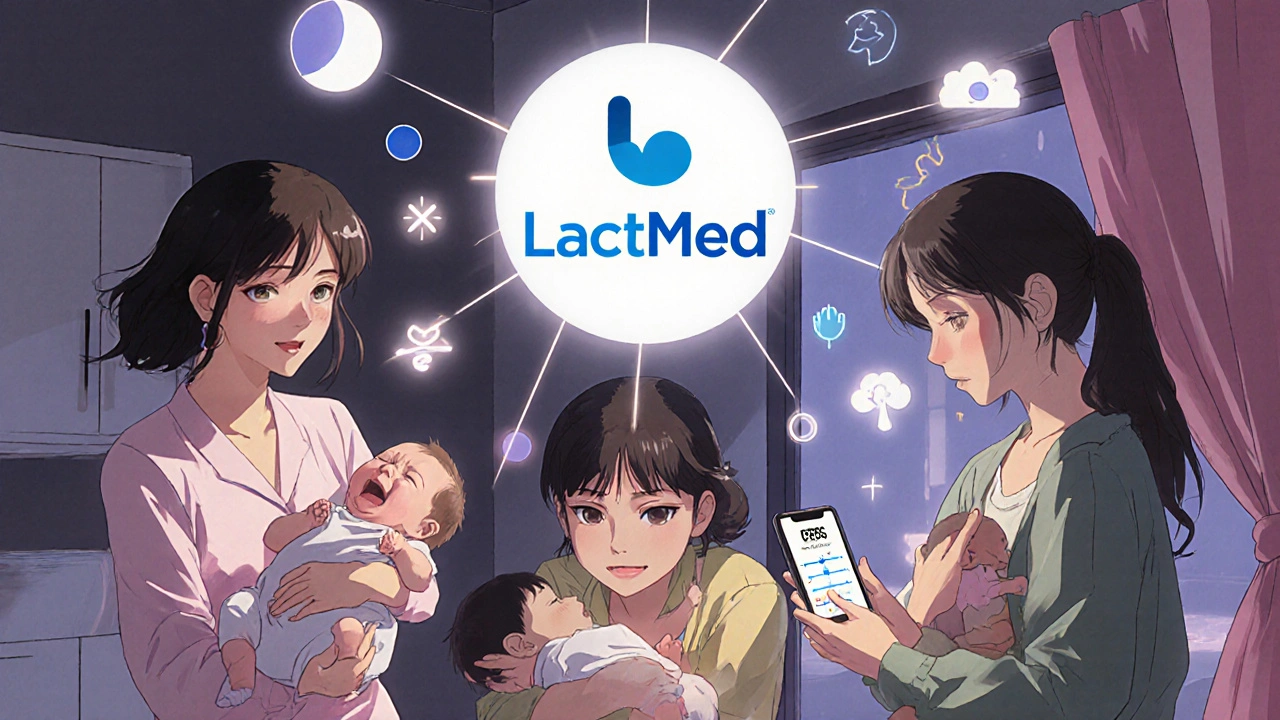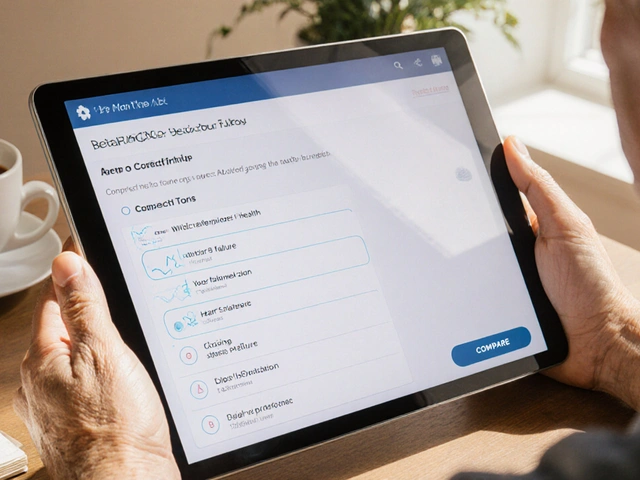Breastfeeding Medication Safety Checker
Medication Safety Report
Enter an antidepressant name to see safety information for breastfeeding.
Postpartum depression isn’t just feeling sad after having a baby
It’s exhaustion that doesn’t go away. It’s crying for no reason while holding your newborn. It’s feeling like you’re failing-when all you want is to be the mom your baby deserves. About 1 in 8 new mothers experience this. And if you’re breastfeeding, the question isn’t just how to feel better-it’s can I take medication without hurting my baby?
Medication isn’t the enemy-untreated depression is
Many women stop antidepressants when they find out they’re breastfeeding. They’re scared. And honestly? That fear is understandable. But here’s the hard truth: untreated postpartum depression puts both you and your baby at greater risk than most medications do.
The American College of Obstetricians and Gynecologists, the CDC, and the American Academy of Pediatrics all agree: treating your depression is safer than leaving it alone. Your baby needs a connected, responsive mom. Depression makes that nearly impossible. Medication can help you get back to being present-feeding, smiling, holding your baby without numbness or panic.
Not all antidepressants are the same when breastfeeding
Some pass into breast milk in tiny amounts. Others? Not so much. The key is choosing the right one.
Sertraline is the most recommended. Studies show less than 3% of your dose gets into breast milk. In over 90% of cases, babies have undetectable levels in their blood. Moms report feeling like themselves again-without fussiness, sleep issues, or feeding problems in their babies.
Paroxetine is close behind. It’s also low-risk, with transfer rates under 9%. It’s often used when sertraline doesn’t work. Both are first-line choices for breastfeeding moms.
Now, here’s what to avoid-or at least, be very careful with:
- Fluoxetine (Prozac): It sticks around in your system for weeks. That means your baby gets a slow, steady dose over time. There are real cases of irritability and poor feeding linked to it.
- Doxepin: Even at low doses, it’s been tied to infant apnea and blue spells. Not worth the risk.
- Bupropion (Wellbutrin): It raises seizure risk in babies, especially newborns. Skip it unless there’s no other option.
What side effects should you watch for in your baby?
Most babies show no reaction. But if you notice any of these in the first two weeks after starting medication, call your doctor:
- Excessive sleepiness or difficulty waking to feed
- Fussiness that doesn’t settle, even with holding or rocking
- Feeding problems-taking less, refusing the breast, vomiting
- Diarrhea or unusually loose stools
- Unusual crying or high-pitched screaming
These aren’t common. But they’re important. Most resolve on their own or with a small dose adjustment. One mom on a breastfeeding forum shared: “My daughter had explosive diarrhea after I started fluoxetine. Switched to sertraline-problem gone in 48 hours.”
Don’t panic if you see something odd. But don’t ignore it either. Keep a quick note: what happened, when, and how long it lasted. That info helps your doctor decide what to do next.

Timing your doses can make a difference
You don’t have to stop breastfeeding to take medication. In fact, you can minimize your baby’s exposure just by changing when you take it.
Take your pill right after a feeding-ideally, right after your baby falls asleep for the night. That gives your body time to break down the drug before the next feeding. For drugs like sertraline, which clear quickly, this can reduce infant exposure by half.
Some moms use a “pump and dump” strategy, but that’s usually unnecessary. You’re not poisoning your milk. You’re just giving your baby a little less of a very small amount. Pumping won’t make it safer-it just makes you more tired.
New options are here-but tread carefully
In August 2023, the FDA approved zuranolone (Zurzuvae), the first pill made specifically for postpartum depression. It works fast-half the women in trials felt better in two weeks.
But here’s the catch: the clinical trials didn’t include breastfeeding moms. The label says there’s no data on whether it passes into milk. Yet, early estimates suggest the amount is very low-less than 1.5% of your dose.
Right now, ACOG recommends pumping and discarding milk for a week after your last dose. But experts at LactMed say that’s probably overcautious. Many doctors are now offering it to breastfeeding moms with close monitoring. If you’re considering it, talk to a specialist. Don’t assume it’s automatically safe-or automatically off-limits.
How do you know if the treatment is working?
Antidepressants don’t work overnight. It takes 3 to 4 weeks to see real change. Don’t give up after a week. But if you’re still crying every day, feeling numb, or thinking you’re a burden after 4 weeks-it’s time to talk to your doctor about adjusting your dose or switching meds.
Use the Edinburgh Postnatal Depression Scale (EPDS). It’s a simple 10-question test your OB or pediatrician should ask you at your 1-, 2-, 4-, and 6-month checkups. If your score is 13 or higher, you likely need help. Don’t wait for your next appointment. Call now.

Real stories from real moms
One mom wrote on a parenting forum: “I was so tired I couldn’t even hold my baby for more than a minute. Sertraline didn’t make me feel ‘happy’-it just made me feel like I could breathe again. My baby slept better, ate better. I finally smiled when he looked at me.”
Another said: “I stopped my meds because I was scared. Two weeks later, I was crying in the shower while washing his onesie. I went back on sertraline. My husband said I was ‘back.’”
These aren’t rare. They’re common. And they’re proof that treatment works-not by magic, but by giving your brain the support it needs to heal.
Resources you can trust
Don’t guess. Don’t rely on random internet posts. Use these:
- LactMed (from the National Library of Medicine): Updated weekly. Free. Covers over 1,300 drugs. Search by name. It tells you exactly how much gets into milk and what the risks are.
- InfantRisk Center: Call 806-352-2519. They answer questions from doctors and moms every day. Antidepressants are their most common call.
- Postpartum Support International: Offers free support groups, peer counseling, and provider directories. You’re not alone.
What if you can’t take medication?
Some moms prefer therapy, light therapy, or lifestyle changes. That’s fine-if it works. But if your depression is severe, those alone often aren’t enough.
Therapy (like CBT or interpersonal therapy) is highly effective for mild to moderate PPD. But if you’re too exhausted to get out of bed, therapy won’t fix that. Medication can give you the energy to show up for therapy.
Don’t see it as an either/or. It’s often both.
You’re not weak for needing help
It’s not selfish to take a pill to feel like yourself again. It’s the most loving thing you can do for your baby. Your baby doesn’t need a perfect mom. They need a present one. And medication can help you be that.
Start low. Go slow. Watch your baby. Talk to your doctor. You’ve already done the hardest part-you’re asking the question. Now take the next step.






